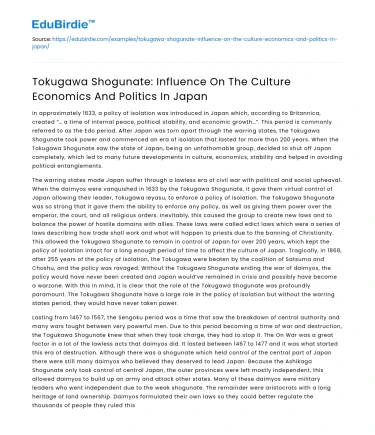In approximately 1633, a policy of isolation was introduced in Japan which, according to Britannica, created “… a time of internal peace, political stability, and economic growth…”. This period is commonly referred to as the Edo period. After Japan was torn apart through the warring states, the Tokugawa Shogunate took power and commenced an era of isolation that lasted for more than 200 years. When the Tokugawa Shogunate saw the state of Japan, being an unfathomable group, decided to shut off Japan completely, which led to many future developments in culture, economics, stability and helped in avoiding political entanglements.
The warring states made Japan suffer through a lawless era of civil war with political and social upheaval. When the daimyos were vanquished in 1633 by the Tokugawa Shogunate, it gave them virtual control of Japan allowing their leader, Tokugawa Ieyasu, to enforce a policy of isolation. The Tokugawa Shogunate was so strong that it gave them the ability to enforce any policy, as well as giving them power over the emperor, the court, and all religious orders. Inevitably, this caused the group to create new laws and to balance the power of hostile domains with allies. These laws were called edict laws which were a series of laws describing how trade shall work and what will happen to priests due to the banning of Christianity. This allowed the Tokugawa Shogunate to remain in control of Japan for over 200 years, which kept the policy of isolation intact for a long enough period of time to affect the culture of Japan. Tragically, in 1868, after 255 years of the policy of isolation, the Tokugawa were beaten by the coalition of Satsuma and Choshu, and the policy was ravaged. Without the Tokugawa Shogunate ending the war of daimyos, the policy would have never been created and Japan would’ve remained in crisis and possibly have become a warzone. With this in mind, it is clear that the role of the Tokugawa Shogunate was profoundly paramount. The Tokugawa Shogunate have a large role in the policy of isolation but without the warring states period, they would have never taken power.
Save your time!
We can take care of your essay
- Proper editing and formatting
- Free revision, title page, and bibliography
- Flexible prices and money-back guarantee
Lasting from 1467 to 1567, the Sengoku period was a time that saw the breakdown of central authority and many wars fought between very powerful men. Due to this period becoming a time of war and destruction, the Togukawa Shogunate knew that when they took charge, they had to stop it. The On War was a great factor in a lot of the lawless acts that daimyos did. It lasted between 1467 to 1477 and it was what started this era of destruction. Although there was a shogunate which held control of the central part of Japan there were still many daimyos who believed they deserved to lead Japan. Because the Ashikaga Shogunate only took control of central Japan, the outer provinces were left mostly independent, this allowed daimyos to build up an army and attack other states. Many of these daimyos were military leaders who went independent due to the weak shogunate. The remainder were aristocrats with a long heritage of land ownership. Daimyos formulated their own laws so they could better regulate the thousands of people they ruled this allowed for them to more easily keep in control of their states. The warring states period or the more known referral, the Sengoku period, was a time that saw Japan fall into violence and turbulence due to several daimyos believing they could rule the whole of Japan, this caused the policy of isolation.
Nowadays, Japan is noticed for having unique cultures and traditions but without the policy of isolation, the country would just be like any other from the west. Separating themselves from the rest of the world for over 200 years caused the Japanese to have different thoughts and religions developed, leading to them having such a diverse culture. Before Japan was isolated from the rest of the world, they stole ideas from other countries but with the isolation in place, they were without influence, causing them to engender their own, unique culture. For more than 200 years, Japan remained instability, this was due to the fact that there were no external threats, and till the 1850s they were free from an intrusion. This also created a favorable background for Japan which led to economic and social prosperity, this was mostly due to agriculture being inspirited and cities growing one by one. The Sakaki policy additionally allowed for the reviving of classical and traditional learning by making Confucianism the state learning technique, this ultimately resulted in the widening of the technological gap between Japan and the west which can easily be seen today. But along with these benefits were negatives, this includes a stop in cultural fields due to the little or social mobility as Japan only had contact with a few countries who were all for trade. As well as this, it resulted in the retardation in Japanese overseas expansion as foreign settlements were kicked out and people abroad were not allowed to travel home. Without the policy of isolation, Japan would be just like any other country, as they would have continued to be influenced by them.
In conclusion, the Tokugawa Shogunate had a major influence on the culture, economics, and politics in Japan. This is because they had a major role in the creation of the policy of isolation which benefited Japan long term in many different forms including them making their own ethics, their economy rising and Japan having a fixed feudal system. This means that the Tokugawa Shogunate was probably somewhat celebrated for their work and how much they have actually done for Japan.






 Stuck on your essay?
Stuck on your essay?

